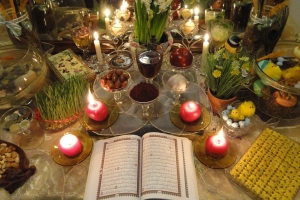The word `Nowruz` is a compound word; No and Ruz together mean New Day, and it is the name of the first day of the first solar month.
Abū Rayhān al-Bīrūnī in his definition of Nowruz says: `It is the first day of the month of Farvardin( March 21th) and the reason it is called New Day is that it is the forehead of the year `.
The emergence of Islam and its peaceful dealing with other religious beliefs and rituals, including ceremonies and rituals of the Iranian people, resulted in Nowruz to remain untouched.
In Iranian ancient belief, Nowruz is the day when the Creator finished the creation of the world and is the day when Man was created.
It was also celebrated in Syria, Egypt and North Africa but not regularly. After the spread of Islam and its adaptation by the people of Iran, Nowruz found its way to expand to wider range of people even amongst non- Iranian tribes, such in Indian continent and North Africa.
Nowruz has been highly regarded. Alameh Majlesi in Assamae va al Alam has narrated one of the sayings of Imam Sadiq (a) as follows: ` With the beginning of Farvardin, human was created, and this day is an auspicious day for praying to seek dreams, to visit the nobles, acquiring knowledge, marriage, travelling and good business. In this blessed day the sick will be cured, the babies are born hassle free and sustenance will increase. ` Majlesi also talks about another narration from Imam Musa Kadhim (as) which says: `In Nowruz Allah made a covenant with His servants to worship Him and not to allow any partner for Him. To welcome, His messengers and obey their rulings. This day is the first day that the fertile wind blow and the flowers on the earth appeared. The archangel Gabriel (a) appeared to the Prophet, and it is the day that Abraham (as) broke the idols. The day Prophet Muhammad (S) held Ali (as) on his shoulders to destroy the Quraishies' idols in the house of God, the Kaaba.`
In addition the most symbolic rituals of Nowruz which is the preparation of `seven S` has both ancient and Islamic roots. In his research `Nowruz and the Philosophy of Seven S` Mohammad Ali Dadkhah explains: `Number seven, is sacred and part of the elite. The choice of this number in the preparation of Nowruz is very significant. In the ancient Iran this number was associated with seven holy immortals. In astronomy number seven is the house of dreams, and accomplishing wishes is promised in the seventh abode.` Alameh Majlesi in regards to the importance of number seven says: `The heaven and Earth each have seven levels and each level is guarded by an angel.` He also says: `If at the time of New Year, one recites seven verses of Qur'an which starts with letter S, one would be protected against any afflictions`.
Eid, in this verse is referring to a Divine blessing descended from heaven in the form of a tray, or trays of delicious and edible food, so it became a sign for people to commemorate such day every year and bring joy and happiness repeatedly. Also repetition and return of such days could return same blessings which give us, human, another chance to make connection with God and remembering Him in our hearts and by our tongues.
Imam Jafar Al Sadiq(as)said: `When Nowruz comes, make Ghosl (ceremonial wash) , put on your clean clothes, and fragrant yourself with best perfumes, so when you are free of all other prayers, perform a four- rakaat prayer, each two rakaats one Salam and in the first rakaat after Sura Al- Fateha ten times Sura Al-Qadr, and in the second rakaat after Al-Fateha ten times Al-Kaferoon. In the thried rakaat after Al- Feteheh ten times Al-Nass and Al-Falaq. After prayer prostrate in gratification.` As we can see the rituals of Nowruz is the same as rituals for any other Islamic Eids of which its supplication starts with offering salutations to the messenger of Allah and his progeny and all the messengers of God. Nowruz has always been celebrated by Iranians. Its customs, despite the thousands of years, has never been demolished or forgotten.
Nowruz has been a festivity celebrated by all the tribes, ethnic groups or religions that existed and lived in the Iranian Plateau for centuries and today many other countries, celebrate noruze such as Afghanistan, Pakistan, India and even some central Asian countries such as Kurds of Turkey, Iraq and Syria celebrate it too.


















